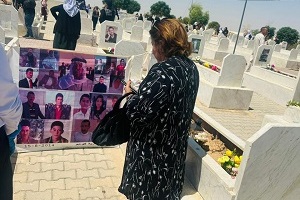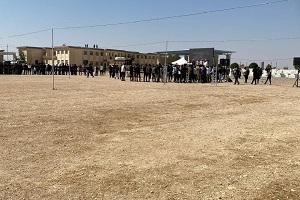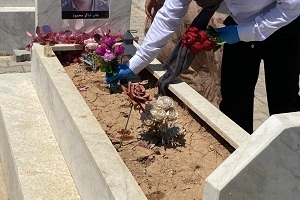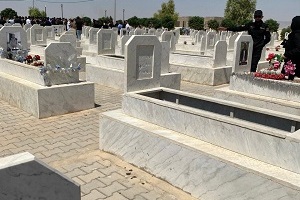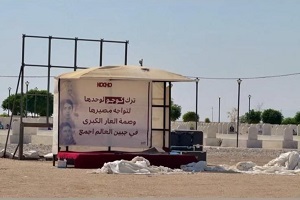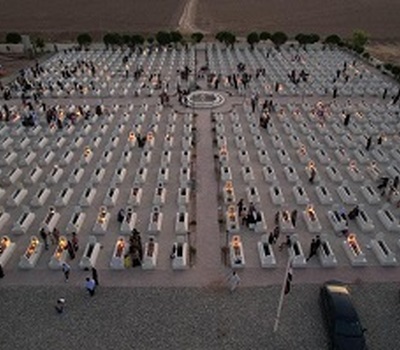
- William Warda: The American and European policy drawn up for Iraq consider the interests in the relationship with the major components without regarding the rights of minorities.
- Mr. Warda / The Christian component has not put forward any political initiative on the national level since 2003 and till now that could constitute a public opinion issue or a key to ensuring a safe life for Iraqi Christians.
In the symposium held on August 5, 2024 in Erbil - Ankawa, sponsored by the Syriac Culture Directorate in the Kurdistan Region of Iraq and in partnership with the Otto Human Rights Organization, hosted the researcher and activist William Warda, Director of Public Relations and Media at the Hammurabi Human Rights Organization, in remembrance of the tragedy of the genocide against the Yazidis, Christians, Shiite Shabaks and Turkmen by the terrorist ISIS in Nineveh in 2014.
The event was dedicated to discussing the fate and future of Chaldean Syriac and Assyrian in Iraq ten years after the genocide, displacement, murder, rape and captivity to which they were subjected in Mosul and the Nineveh Plain. The event also included a screening of a documentary film on the genocide and an art exhibition that included photos and scenes of the crime.
Mr. Warda noted that “the Iraqi Christian like the rest of the other Iraqi components, is also a victim of the conflict and regional influence over Iraq, especially in the context of the tension and contradiction between the Turkish and Iranian policies towards Iraq. Thus, minorities often pay the highest price as a result of these disputes and conflicts, adding that "Minorities, especially Christians and Yazidis, pay for security and political problems between
Baghdad and Erbil under article 140 of the Iraqi Constitution. The different views of the parties in their application have created so-called disputed areas, most of which are inhabited by minorities, primarily Christians and Yazidis, the failure to resolve the position on this article has resulted in security, political, economic and development problems for the Christian component in its attempts and endeavors to find a safe haven for it away from the disputes between Baghdad and Erbil.
On the subjective realities of Christians, Mr. Warda said: "The Christian political landscape and the nature of their political relations are only a framework including a series of dictates of large political and regional components, and most actors are subject to security and political pressures, unfortunately the reaction of the Christian component is mostly weak and unimpressive.
As for the Christian movement, Mr. Warda pointed out: "Since 2003, the Christian component has not put forward a political initiative at the national level that could constitute an issue of public opinion or a proposal to secure a safe life for Iraqi Christians, adding that "Christians, like other minorities, lack any kind of real solidarity. On the contrary, their reality is characterized by fragmentation and division in accordance with the political interests of one or the other party, and has been subjected to the influences of the interests of the large components. The same scene replicates itself on the spiritual level as divisions between churches have intensified and there are no real indications of solidarity, and the absence of unity of attitude.
Mr. Warda focused on three main concerns affecting the Christian future in Iraq:
1- The possibility of the return of violence due to the existence of great fears and concerns over conflicts among the components of minorities in the Nineveh Plain after liberation under the uncontrolled militia armament that goes back to multiple political references. As well as division within the Christian component in this regard and the entry of the church into the line, which caused more severe divisions reflecting on Christian-Christian relations
2- The weakness of the international stance in dealing with the rights of minorities, as the American and European policy drawn up for Iraq takes into consideration, above all, its interests in the relationship with the major components, while its moral and political duty, in accordance with international covenants and instruments related to human rights, requires it to defend, show solidarity and organize the rights of minorities.
3- The escalation of the migration phenomenon, especially after the horrific crimes of ISIS, which constitute genocide in all its dimensions, including forced displacement, expulsion of residents from their places of origin, killings, kidnappings, looting, and dispossession of citizens of their property and valuables, and in the horrific way, selling women and children, forcing girls to marry militants, forcing them to change their religious beliefs, and smashing, blowing up, and destroying many archaeological landmarks and religious symbols represented by monasteries, churches, Yazidi temples, mosques, and Husseiniyas of some Muslim minorities in the Nineveh Plain and Tal Afar.
Before concluding the symposium, Mr. Warda present an explanation to address the entitlements of Christians in order to survive, determine the future and destiny, and ways to defend rights and strengthen partnership with other Iraqi components in shaping the present and future of Iraq within a national project that provides the requirements for a safe and dignified life, emphasizing the following points:
- Christians can not realize some of their ambitions and hopes unless they have a well-defined project.
- That all Christian elites, activists and opinion leaders meet on a comprehensive work program and executive mechanisms, considering that everything that happened even if it was due to external factors related to the fundamentalist approach and the tendency to dominate and monopolize from others, an important aspect of what Christians are exposed to is borne by the Christian component itself, because some of our losses are caused by the existence of personal tendencies and poor relations between the elites of the Christian component.
- The launching of any project to guarantee the constitutional rights of Christians, protect national abilities and preserve their identity cannot be achieved unless there is an attempt to address the breaches and contradictions in the Christian component's orientation. In this direction, Christians are required to be a force of pressure with clear steps towards strengthening the intrinsic-strength of the Christian component.
- At the same time, all available means of pressuring the Iraqi public to correct the course of the political process should be used to ensure that the Christian component has a genuine sanctuary in (Iraq) or the so-called real protection with all meanings of protection that we may come to explain later.
In this context, Mr. Warda presented some steps required for action and action, as follows:
- To promote the unification of armed factions, since the existence of intersections and conflicts between these armed factions, particularly within their leadership, makes them vulnerable to containment within political factions, some of which are not only linked to the Federal Government and the Regional Government, but may with external links
- Work to unify the spiritual discourse of the Iraqi Church and at least unify the attitude towards common destiny issues and at least have a minimum openness and understanding between Christian secular and religious leaders.
- It is urgently necessary to establish a Political Operations Room for the Christian Component to respond to any infringement of this component's rights, as well as to activate the state of public Christian opinion in the adopting local issues occurring in different Christian areas.
- It is necessary to take into consideration the violations that occurred on Christian lands in the Nahla region. The movement that took place to confront this violation was very weak and did not include the will of the entire Christian component. The same is true regarding the crisis of Patriarch Sako with the presidency of the republic and the withdrawal of the republican decree from him.
The Christian component did not show a unified stand of solidarity and did not confront the other with a cohesive will in which all Christian capabilities participated, both at home and abroad, in a way that would give the Christian component its real and influential weight and prevent the passage of violations and abuse, even if they were small, because remaining silent about a small violation might push the large or authoritarian components to persist in their policies to violate the rights of Christians and other minorities.
Mr. Warda also added many necessary and basic steps and observations that provide protection for Christians and other religious and ethnic minorities that fall on the Iraqi state by applying the laws, legislation and international obligations in accordance with the principles of international law.


